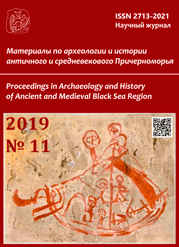Российская академия наук и судьба культурно-исторического наследия Крыма в 1917—1918 гг. (коллекции А.Л. Бертье-Делагарда)
Russian Academy of Sciences and the fate of cultural-historical heritage of Crimea in 1918—1919 (Collection of A.L. Berthier de la Garde)
Author(s): Mikhail D. BukharinSubject(s): History, Cultural history, Recent History (1900 till today), 19th Century, Pre-WW I & WW I (1900 -1919)
Published by: Нижневартовский государственный университет
Keywords: historical and cultural collections; Crimea, museums; archives; Russian Academy of Sciences; A.L. Berthier de la Garde; S.F. Oldenburg
Summary/Abstract: Immediately after the October coup d’êtat of 1917 a question of preservation of historical and cultural heritage of Russia was sharply raised. Many private and state collections were under direct threat of destruction due to sales or melting. Robberies, mass vandalism led to numerous irretrievable losses. Members of the Russian Academy of Sciences realized the course of events and some of them set a question of need to take urgent measures for preservation of the Russian material culture. Academicians S.F. Oldenburg, N.Ya. Marr, V.V. Barthold, a number of other outstanding scientists (P.K. Kozlov), the staff of different museums actively participated in such activity. A.L. Berthier de la Garde (1842—1920), who lived and worked in the Crimea was one of outstanding researchers and collectors of Classical and “Barbarian” antiquities. He appeared in extremely difficult situation because of old age, the state of health and lack of income. At the beginning of 1918 the Taurian Scientific Archival Commission has appealed to the Russian Academy of Sciences to save a unique historical collection of A.L. Berthier de la Garde (1842—1920) and to support the scientist. The Permanent secretary of RAS S.F. Oldenburg has addressed the people’s commissar of education A.V. Lunacharsky with a request to help to resolve this problem, however changes of political powers in Crimea in 1918—1919 have prevented its solution and the most valuable collection has been sold in parts. At the moment a part of collection of Berthier de la Garde is stored in the British museum.
Journal: Материалы по археологии и истории античного и средневекового Причерноморья
- Issue Year: 2019
- Issue No: 11
- Page Range: 572-579
- Page Count: 8
- Language: Russian

